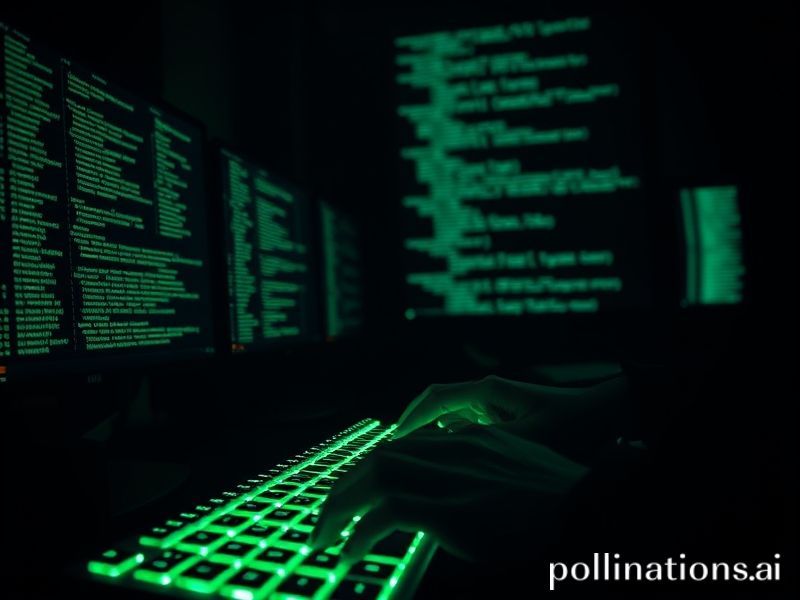The Hack Cast Goes Global: How Every Breach Becomes a Worldwide Farce
The Hack Cast: A Global Theatre Where Everyone’s the Fool and the Script Keeps Rewriting Itself
By Diego “Dredge” Moreau, Senior Cynic-at-Large, Dave’s Locker Bureau of Diminishing Returns
The phrase “the hack cast” sounds like a rejected Netflix pitch about rogue dermatologists, but in 2024 it is the depressingly accurate collective noun for the planet’s ever-swelling roster of compromised actors: politicians, CEOs, influencers, and that one guy in Lagos who still insists his crypto exchange can double your money overnight. Call them actors, call them grifters—either way, the show is on every channel, subtitles optional, and the popcorn is laced with microplastics.
Let’s zoom out. A decade ago, being “hacked” meant a teenager in Vilnius defaced your Angelfire page. Today, it’s a geopolitical event. One leaked password in Brussels can send the Shanghai bourse jittering; a single spear-phish in Kyiv can reroute Berlin’s heating bills. The hack cast is therefore not a group but a condition—like long Covid, only more profitable. Its members are united less by ideology than by the shared discovery that shame, when properly monetised, converts nicely into speaking fees.
Take the recent “Mumbai Watercooler” breach—1.2 million corporate emails dumped onto a Tor site styled like a 1998 fan forum. The victims span thirty-seven nations, proving once again that Excel spreadsheets are the Esperanto of corporate despair. Analysts in Toronto blamed North Korea; pundits in Seoul blamed bored Ukrainian teenagers; meanwhile, a retired colonel in Bakersfield blamed fluoride. The only consensus is that everyone looked ridiculous, especially after it emerged the leak was orchestrated by a seventeen-year-old in Montevideo who wanted to impress a girl who studies astrophysics and has, tragically, never logged into LinkedIn.
Globalisation’s great gift is that embarrassment now travels at the speed of fibre-optic light. When Australia’s largest telecom admitted its customer data was siphoned by a “sophisticated actor,” the term was dutifully translated into seventeen languages, each version slightly more flattering than the last. In Tokyo, press officers bowed; in Paris, they shrugged; in Washington, they scheduled a hearing for sometime between never and midterm elections. By Friday, the breach had already been forgotten everywhere except the dark web, where it was bundled into a starter kit for aspiring script kiddies in Jakarta and sold at a “back-to-school” discount.
The hack cast loves nothing more than a moral panic because panic burns brighter than any PR budget. Consider the “Panama Papers 2.0” sequel nobody asked for, where the main revelation is that rich people still hate taxes and journalists still love alliteration. Iceland’s prime minister resigned again—some traditions are worth preserving—while the UK opposition demanded “something must be done,” code for forming a committee that meets quarterly in a room too expensive to heat. In Nigeria, a minister shrugged and pointed out that at least their own offshore accounts were hacked by professionals, unlike neighbouring countries that rely on amateurs.
Ironically, the surest route into the hack cast is claiming you’re unhackable. The moment a CEO utters “military-grade encryption,” somewhere a teenager in Moldova sneezes and 40 million passwords vanish. It’s cosmic karma administered via API. The more you posture about cybersecurity, the faster you join the montage of tearful apology videos—each filmed in the same beige boardroom, each subtitled “we take your privacy seriously,” each soundtracked by the gentle weeping of a legal intern clutching a Red Bull.
What does it all mean? Simply that the world’s stage lights have been rewired for perpetual exposure, and everyone’s contract contains the same tiny clause: “Acting talent not required; willingness to be disgraced in multiple languages preferred.” The hack cast is the first truly global ensemble where the script is written post-production, the critics are anonymous, and the box office returns are denominated in bitcoin that may or may not exist tomorrow.
Curtain call? More like curtain firewall. Until the next breach—scheduled, as always, for “shortly after you finish reading this sentence.”







